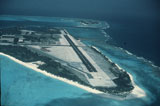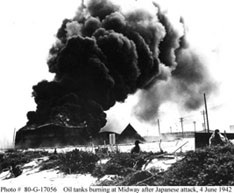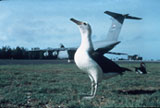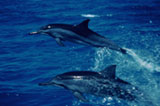|
You
are here: /main/about/midway
atoll
Midway
Atoll
(Pihemanu)
 Midway,
the best known of the Northwestern Hawaiian Islands (NWHI),
is a circular-shaped atoll with three small islets (Sand,
Eastern, and Spit) on the southern end of a lagoon. While
its land area is small, about 1,535 acres, the atoll has approximately
85,929 acres of reef area. Midway,
the best known of the Northwestern Hawaiian Islands (NWHI),
is a circular-shaped atoll with three small islets (Sand,
Eastern, and Spit) on the southern end of a lagoon. While
its land area is small, about 1,535 acres, the atoll has approximately
85,929 acres of reef area.
Captain N.C. Brooks of the Gambia sailed to the atoll in
1859. After Brooks, the United States annexed it as the first
insular possession to be claimed outside the U.S. continent.
Early visitors included the castaway crews of several large
sailing vessels, such as the American-built bark Carrollton.
Survivors built low huts on the treeless island and awaited
rescue by (infrequent) passing vessels. Other people made
their way to Midway during the late 1800's promarily to collect
feathers and eggs.
The United
States recognized the strategic importance of Midway as
early as 1870, when efforts were begun to clear
a southern channel into the calm lagoon. It was clear that
Midway’s geographical position as a “stepping
tone across the Pacific” made the island a critical
link in cable communications (1903) and as an early transpacific
Panamerican seaplane stop (1935). Work began on the military
facility at Midway in March 1940.
During World War II, Midway
served as an important naval air station and submarine
refit base. The atoll was attached
twice, first of December 7th 1941, and again during the
pivotal Battle of Midway, June 4th-6th 1942. A successful
American
intelligence operation tipped the US forces to the planned
attack, and a small US task force was able to surprise
and defeat the Japanese invasion fleet bound for the atoll.
Many
interpret this battle as the watershed moment in the tide
of the Pacific War. Though the major carrier-based actions
took place to the north, a fierce air battle was waged
over Midway and Eastern Islands themselves.
 During
World War II, Midway became a major U.S. military base. The
atoll was attacked twice, once on December 7, 1941, after
the attack on Pearl Harbor, and again during the pivotal Battle
of Midway, which turned the tide of the War in America's favor.
The atoll was designated as the National Memorial to the Battle
of Midway in 2000. During
World War II, Midway became a major U.S. military base. The
atoll was attacked twice, once on December 7, 1941, after
the attack on Pearl Harbor, and again during the pivotal Battle
of Midway, which turned the tide of the War in America's favor.
The atoll was designated as the National Memorial to the Battle
of Midway in 2000.
During the Cold War Era Midway served as the staging point
for defensive air patrols along the Distant Early Warning
(DEW) Line. With the increasing use of satellite observation,
such patrols became unnecessary, and in 1996 the once strategic
naval base was turned over to the U.S. Fish and Wildlife
Service to be managed as Midway Atoll National Wildlife Refuge.
A massive U.S. Navy clean up prior to their departure removed
tons of debris, leaky fuel tanks, and lead paint, as well
as rats. Today a fulltime Refuge staff administers a small
visitor program, cares for its wildlife, restores native
plant life, and protects historic resources. The wreck of
the Macaw, a 250-foot submarine rescue vessel lost in 1944,
marks the site of one such historic wartime event in Midway's
waters.
 Nearly
two million birds of 19 species nest on Midway. The atoll
has the largest Laysan albatross colony in the world. Other
birds include black-footed albatross, red-tailed tropicbirds,
white terns, black and brown noddies, shearwaters, and Bonin
petrels. One of the rarest visitors is the endangered short-tailed
albatross. Nearly
two million birds of 19 species nest on Midway. The atoll
has the largest Laysan albatross colony in the world. Other
birds include black-footed albatross, red-tailed tropicbirds,
white terns, black and brown noddies, shearwaters, and Bonin
petrels. One of the rarest visitors is the endangered short-tailed
albatross.
Three-fourths
of Midway's plant species were introductions. These include
weeds, ornamental shrubs, exotic vegetables, and trees such
as coconut palms and ironwood. Major efforts are underway
to control alien species and restore native habitats.
 The
waters abound with dolphins, monk seals, and green sea
turtles. More than 250 species of fish live in its waters,
including hapu`upu`u (the Hawaiian grouper usually caught
at depths exceeding 150 ft in the MHI, but often seen at
diving depths at Midway), ulua (jack), kumu (goatfish),
and sharks. Beyond the reefs are pelagic fishes such as
tuna and marlin. The
waters abound with dolphins, monk seals, and green sea
turtles. More than 250 species of fish live in its waters,
including hapu`upu`u (the Hawaiian grouper usually caught
at depths exceeding 150 ft in the MHI, but often seen at
diving depths at Midway), ulua (jack), kumu (goatfish),
and sharks. Beyond the reefs are pelagic fishes such as
tuna and marlin.
Despite 100 years of human impact, the reef at Midway is
rich and diverse. Sixteen species of stony coral have been
reported, and scientists believe there may be many more.
Marine habitats, including spurs, grooves, and sand channels,
are home to several algaes, seagrass meadows, urchins, bi-valve
clams, sponges and more. Two species of seagrasses are found
at Midway, one of which is a Hawaiian endemic, and the second
species is one not previously recorded from the Hawaiian
Islands.
<<back
-- next>>
 Talk About It! Talk About It!
Plants found on Nihoa
Asked by Jack from wildlife refuge on Oct 27, 2003.
What plants are on Nihoa.
Answered by Andy from NOAA on Oct 27, 2003.
Aloha Jack, Beth Flint of the US FWS answered your question in detail:
Twenty-five different plant species have been reported from Nihoa through the years. Three of these are endemic (E), 17 indigenous (I) to the Pacific, and five are naturalized aliens (X).
Species........Common Name........Status
Nephrolepis multiflora.....sword fern......X
Pritchardia remota.....loulu.......E
(Listed as Endangered)
Cenchrus echinatus....sandbur........X
Eragrostis variabilis.......'emo-loa........I
Panicum torridum......kakonakona........I
Paspalum sp..._......X
Setaria verticillata.......bristly foxtail........X
Tetragonia tetragonioides......New Zealand Spinach....X
Amaranthus brownii...._....E
(Listed as Endangered)
Heliotropium curassavicum.....nena.......I
Schiedea verticillata...._....E
(Listed as Endangered)
Chenopodium oahuense......'aweoweo......I
Ipomoea indica......koali'awahia......I
Ipomoea pes-caprae.....beach morning glory.....I
Sicyos pachycarpus....._......I
Chamaesyce celastroides.....'akoko.....I
Sesbania tomentosa.....'ohai.....I
(Listed as Endangered)
Sida fallax.....'ilima.....I
Boerhavia repens.....alena......I
Rumex albescens....._ ......I
Portulaca lutea.....'ihi.....I
Portulaca oleracea.....common purslane.....X
Portulaca villosa....._......I
Solanum americanum.....popolo.....I
Solanum nelsonii....._......I
Tribulus cistoides.....nohu......I
On any particular trip we don't see all these plants necessarily because some come out only during the rainier winter season and some of the aliens may have died out completely. Midway - a federal territory in the NWHI
Asked by Dave from retired Refuge Manager, USFWS on Oct 7, 2004.
Very much enjoy following the expedition from home in southern Oregon! Great Job! Maybe one clarification: A question asked about how many islands in Hawaii? The answer included Midway. If I remember correctly, Midway is federal land, now a National Wildlife Refuge, which never has been part of the State of Hawaii. This is quite important because State Congress people, State courts and State laws do not - technically - apply there. Only federal laws and courts apply. Am I correct in remembering this? [Interestingly, Kure is part of the State of Hawaii as I remeber.]
Answered by Dan Suthers (onboard the Hi`ialakai) on Oct 9, 2004.
Dear Dave,
You're right that Midway is not part of the state of Hawai`i. The previous question you refer to was asking how many islands are in the Northwestern Hawaiian Islands. Midway is included in that count, so the reply of 10 was given. You're also right that Kure is part of the state of Hawai`i. This makes Hawai`i over 1200 miles long: "bigger" than Texas! :-) Midway Visitation
Asked by Hayden from U.R.O.P. on Jan 11, 2006.
Aloha! I have a couple questions... Do you think Midway will ever be open to the public again? And is it currently possible to visit Midway at all?
Answered by Andy from NOAA on Jan 16, 2006.
Midway Atoll is managed by the U.S. Fish and Wildlife Service, and the web page for the refuge is:
http://www.fws.gov/midway/intro/default.htm
Please follow links there to the Contacts section and refer your question to them. |